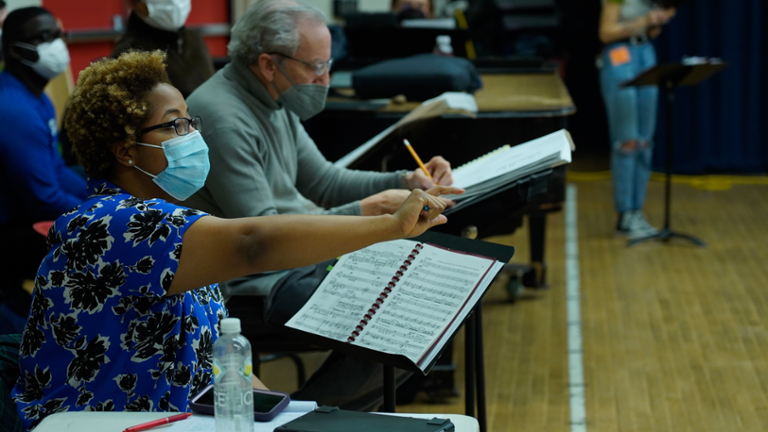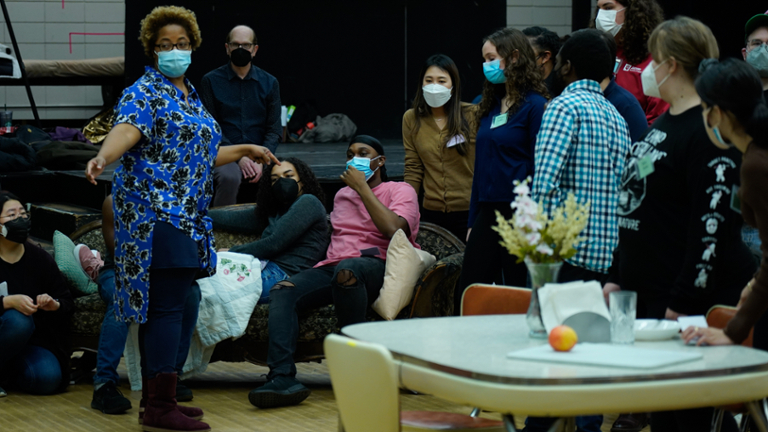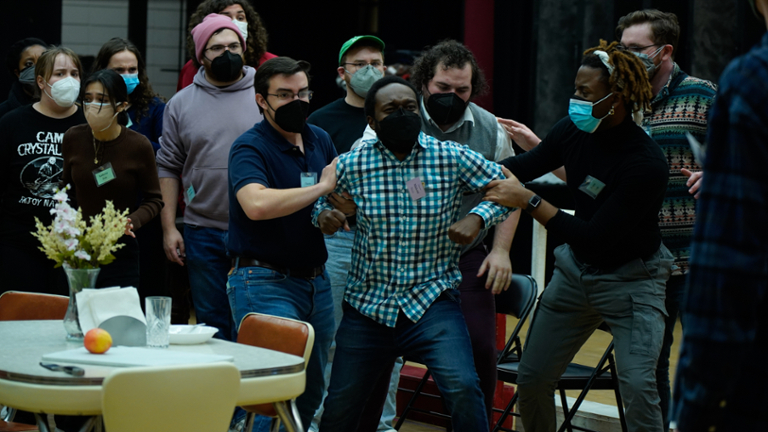From Carmel, Indiana, to the Big Apple, with plenty of detours and stops in between, director Kimille Howard is currently an assistant stage director at the Metropolitan Opera, among numerous other credits.
We caught up with her as she visited the Jacobs School of Music for the first time—in the driver’s seat for William Grant Stills’ Highway 1, USA, opening this Friday, Feb. 4, at the Musical Arts Center.
What draws you to Highway 1, USA and to William Grant Still’s work, in general?
KH: William Grant Still is such an important Black composer who never received the attention and celebration he deserved in his lifetime, so I’m very excited to introduce audiences to his work now. He composed nine operas in his lifetime (including one with Langston Hughes), and only three have ever had productions, due to the unfortunate setbacks of racism during his era. The unknown potential of his six operas waiting to see the stage is exciting!
As for Highway 1, USA, the music is beautiful and romantic with plenty of memorable melodies. It’s so impactful to hear Black classical singers perform a piece that was created specifically for them by someone who looked like them. It’s such a rare experience, especially in academic settings. I also love that this piece puts a dramatic twist on a slice-of-life domestic setting.
Do you think there is a universal message in this work, and do you think it has a special relationship with Black culture, in particular?
KH: It was important to William Grant Still to tell stories about Black life through traditional classical music that could be seen as universal and representative of everyday life, in contrast to the stereotypes that were common on stage during his time.
I think a major message in his work is that Black people DO have relatable stories/life experiences, and we are more than the trauma and stereotypes that dominate most pieces that get produced about Black life. There’s a power in representing the many different facets of Black life, as it may change audiences’ perspectives and perceptions, instilling empathy rather than just sympathy.
Have you directed many operas before? What do you find most challenging and most appealing about this art form?
KH: Yes, I most recently directed a virtual production of Night Trip by Sandra Seaton and Carlos Simon for Opera NexGen and L’Amant Anonyme by Joseph Bologne for Wolf Trap Opera. I think one of the interesting challenges of opera can be making sure the staging allows for the singers to sing out toward the house as much as possible rather than going for naturalism.
One of the many appealing things about opera is the size and scope of the stories you get to tell on stage. From grandiose fantasy adventures with a dragon and mermaids to intimate family dramas, the possibilities seem limitless with opera.
Plus, the music is such a gift to the ears! I have to pinch myself every day when I hear those voices in rehearsal. Some people work in an office, I get to work with talented artists in a rehearsal hall hearing their incredible voices every day.
Your bio describes you as a “deviser.” What does that mean?
KH: One aspect of theater that I love to do is devising, which is a process of taking an idea, a theme, a book, a question, or a collection of things and creating a theatrical piece from the ground up with a group of collaborators. Instead of a playwright writing a script on their own, the team of artists builds the script together.
The creation of a piece can take many shapes, but I usually have a group of actors, myself as the director, and a cowriter come together to explore and create. I’ll give writing assignments; we’ll do different exercises and activities related to the topic; we’ll read or watch things connected to the piece; and we’ll have many discussions.
Over a few workshops, we’ll generate a script together that we’ll then perform.
What strikes you most about working with Jacobs students?
KH: It’s been so great exploring and making discoveries with the students. We’ve been having a lot of fun in the room as we build the piece together. Oftentimes a director is on a tight schedule with a very long opera and may have to be very prescriptive about the staging to get it done in time.
Because Highway 1, USA is on the shorter side, we’ve had enough time for me to give the singers agency to make choices and shape the staging together, personalizing and specifying each beat. It has been a new, transformative experience for many of them that I’m so happy to be a part of!
Anything else you care to share?
KH: I hope that more university classical music programs will produce operas that center BIPOC (Black, Indigenous, People of Color) characters, because it makes such an impact on students of color. Having a diverse cast for standard rep is great and should always happen, but empowering a student of color to sing a role that was meant specifically for them is an important experience that should not be as rare as it is. May this become the norm rather than just once in a blue moon.
This is the first production I’ve ever directed in my home state, and it has truly been an honor to direct Still’s work.
To direct a piece that gives the students of color their first experience performing in a classical piece by a composer of color. To perhaps inspire the next generation of BIPOC classical singers because they see themselves on that stage and feel invited to this world. To encourage new audience members to give opera a try. To show non-toxic Black love on stage. To give singers their first principal role. To introduce new folks to William Grant Still’s work. To change someone’s mind about what stories are worthy of being told on stage. To provide a bit of hope and levity during these strange and difficult times we are in. And above all, to give the audience an enjoyable night at the opera.
This is for those who need it most and everyone in between.
Thank you!




